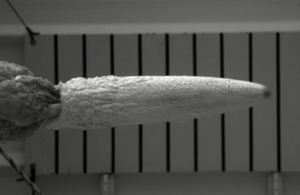£440,000 research funding for next-generation sea mine disposal
Sea mine disposal could be transformed using an innovative technique that is being researched by Dstl (Defence Science and Technology Laboratory).

The Pulse Dart in motion
The concept has received funding worth £440,000 from the Defence Innovation Unit to develop a working prototype and aims to provide a valuable capability for the Royal Navy, enabling minefields to be cleared more efficiently and quickly. Clearing minefields quicker will enhance freedom of operation without increasing risks to the disposal team.
Delivered underwater by a Remotely Operated Vehicle (ROV), Dstl’s Pulse Dart comprises a metal spike and tube. The spike penetrates the hard outer shell of the ordnance, where an electrical charge is applied to initiate the ordnance with the operative a safe distance away.
Mine disposal is an extremely hazardous operation and often undertaken in extremely poor visibility underwater. The Pulse Dart will remove the need for operator filled stores produced on site, reducing handling and proximity to explosives.
The Pulse Dart can reduce overall costs compared to current explosive disposal technology. As the Pulse Dart contains no explosive, moving and storing can be undertaken with minimal risk.
The Pulse Dart concept was created by Dstl scientist Peter Rushforth who won Dstl Innovator of the Year. He said:
Pulse Dart represents years of collaboration with colleagues across Dstl, the Royal Navy and industry. The additional funding will enable a working prototype to be developed by April 2023. Subject to successful trials, a design could go to industry to tender around the same time.
Dstl’s scientists and engineers have produced many notable technologies, for the benefit of UK defence and economic prosperity, and Pulse Dart’s design will be protected by Dstl’s Intellectual Property team.